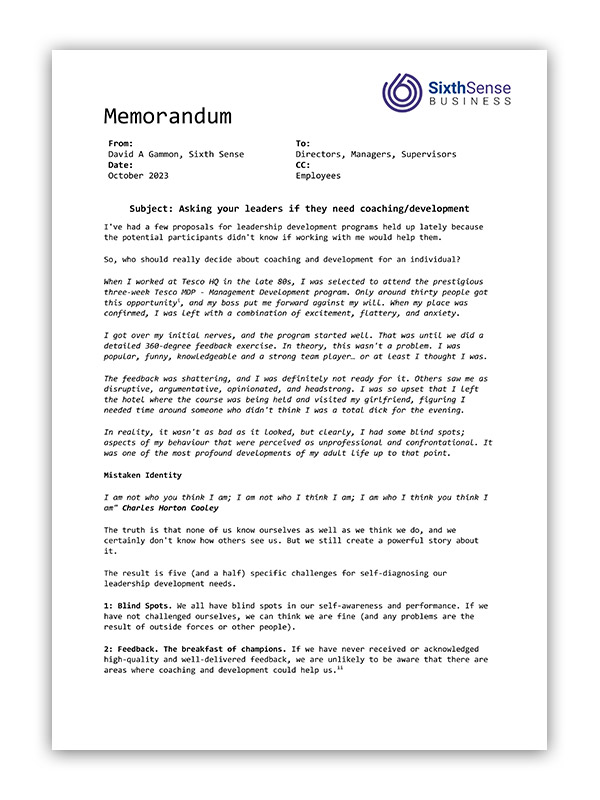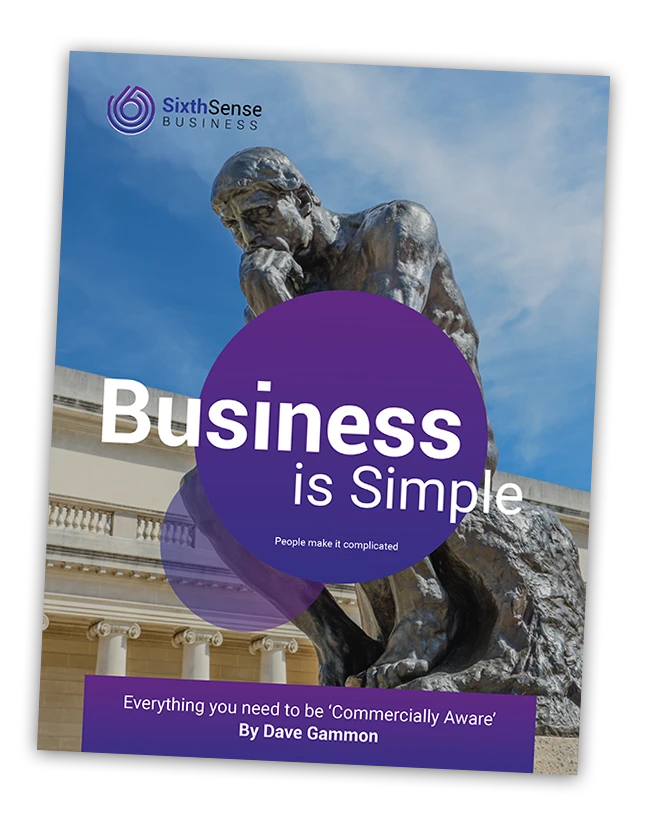From:
David A Gammon, Sixth Sense
To:
Directors, Managers, Supervisors
CC:
Employees
Date:
October, 2023
I’ve had a few proposals for leadership development programs held up lately because the potential participants didn’t know if working with me would help them.
So, who should really decide about coaching and development for an individual?
When I worked at Tesco HQ in the late 80s, I was selected to attend the prestigious three-week Tesco MDP – Management Development program. Only around thirty people got this opportunity i, and my boss put me forward against my will. When my place was confirmed, I was left with a combination of excitement, flattery, and anxiety.
I got over my initial nerves, and the program started well. That was until we did a detailed 360-degree feedback exercise. In theory, this wasn’t a problem. I was popular, funny, knowledgeable and a strong team player… or at least I thought I was.
The feedback was shattering, and I was definitely not ready for it. Others saw me as disruptive, argumentative, opinionated, and headstrong. I was so upset that I left the hotel where the course was being held and visited my girlfriend, figuring I needed time around someone who didn’t think I was a total dick for the evening.
In reality, it wasn’t as bad as it looked, but clearly, I had some blind spots; aspects of my behaviour that were perceived as unprofessional and confrontational. It was one of the most profound developments of my adult life up to that point.
Mistaken Identity
“I am not who you think I am; I am not who I think I am; I am who I think you think I am.”
Charles Horton Cooley
The truth is that none of us know ourselves as well as we think we do, and we certainly don’t know how others see us. But we still create a powerful story about it. The result is five (and a half) specific challenges for self-diagnosing our leadership development needs.
1: Blind Spots. We all have blind spots in our self-awareness and performance. If we have not challenged ourselves, we can think we are fine (and any problems are the result of outside forces or other people).
3: Dunning Kruger. This is a recognised cognitive bias that means in the absence of feedback to the contrary, we tend to assume a higher level of competence and knowledge than we actually hold.
5: Avoiding the unknown. We are often anxious about putting ourselves forward for something, especially if it is novel or exposes us to strangers. I was terrified that I would not be clever enough for the Tesco program.
5.5 Fear of potential. Some people are frightened of what they will become. Many people I work with have a negative association with what it takes to be a high-performing leader. This can colour their judgement about development as they don’t want to be the person they think they need to become.
So, involving people in formulating their answers to leadership development is a good idea. I won’t commit to working with anyone I haven’t spent time with, so we can be sure we will get what we want from the collaboration. However, we also have to remember that there are mental booby traps present.
As a footnote, one personal observation I have had is that Leaders who have been through my brand of development tend to be far more effective at helping others see the value, so perhaps it’s worth investing in at least one coaching session with me yourself before committing others.
(i) In a company of over 80,000
(ii) As the old sales adage goes, you can’t sell someone a plaster if they don’t realise they are bleeding.
(iii) This is a cornerstone principle of my coaching work.

